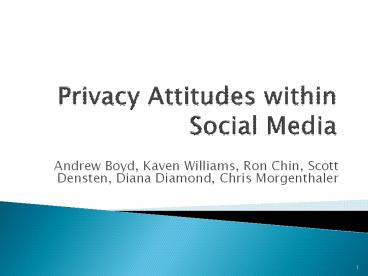Privacy%20Attitudes%20within%20Social%20Media
Title:
Privacy%20Attitudes%20within%20Social%20Media
Description:
Andrew Boyd, Kaven Williams, Ron Chin, Scott Densten, Diana Diamond, Chris Morgenthaler ... May be biased towards overstating privacy concerns ... –
Number of Views:38
Avg rating:3.0/5.0
Title: Privacy%20Attitudes%20within%20Social%20Media
1
Privacy Attitudes within Social Media
- Andrew Boyd, Kaven Williams, Ron Chin, Scott
Densten, Diana Diamond, Chris Morgenthaler
2
Overview
- Privacy, Security and Compliance
- Current State of Research
- IUIPC Model
- Study Design
- Initial Results
- Implications of Findings
- Future Directions for Research
- Questions
3
Privacy, Security and Compliance
- This topic sits at the intersection of
- Psychology
- Management Theory and Corporate Governance
- Economic Social Utility, Social Contract and
Social Network Theory - Computer Science
- It has an impact on
- Civil and Criminal Statutes
- Economic Behaviour
- Civil Rights and Freedoms
- Systems Architecture and Development
- The interplay between Personal and Public
space
4
Current Research
- Various historical models for online privacy
attitudes - Many theoretical models- a dearth of empirical
studies - Main empirical construct is IUIPC
- Internet User Information privacy Concern
- IUIPC draws upon Social Contract theory
- Presents a theoretical framework based on
attitudes and interdependencies towards - Collection
- Control
- Awareness
- of personal information
- These dimensions also form some of the principles
behind many privacy statutes in North America and
Europe.
5
IUIPC Model
- Great for attitudes, not so good for demographics
- May be biased towards overstating privacy
concerns - Clearly highlights gap between attitudes and
behaviours - Our research team extended IUIPC to include a
wider range of demographic co-variants(as a
precursor to establishing new models for
attitudes and behaviours)
6
IUIPC Model Extensions
7
Study Design
- IUIPC- Internet Users Information Privacy
Concerns - Multi-dimensional attitudinal survey scaled on a
Seven Point Likert Scale - Mixed in with behavioural questions about social
media membership and usage - Distributed via Pace email, and personal networks
of team members - Ran March 1- April 30, 2009
- 481 respondents, 390 completed
8
Initial Results
Number Hypothesis Preliminary Finding
H1 Social media privacy attitudes vary by age. Supported
H2 Social media privacy attitudes vary by education. Supported
H3 Social media privacy attitudes vary by internet experience. Not Supported
H4 Social media privacy attitudes vary by ethnicity. Supported
H5 Social media privacy attitudes vary by gender. Supported
H6 Social media privacy attitudes vary by individuals sense of victimization. Supported
H7 Social media privacy attitudes vary by importance of a large group of friends. Not Supported
H8 Social media privacy attitudes vary by media exposure to social media risks. Not Supported
H9 Social media privacy attitudes vary by online context. Not Supported
9
Implications of Findings
- Leveling of privacy attitudes across age groups
- Ambiguities towards trust of social networking
sites - Knowledge, experience and comfort lead to
increased disclosure - Context Matters- Online Normative Behaviour
10
Future Directions for Research
- Examine forces behind leveling of privacy
concerns across age groups - Define ambiguities in trust attitudes towards
social networking sites - Discover why familiarity breeds nonchalance
- Establish the role of context (normative
behaviour) in online attitudes and behaviours
11
Slings and Arrows
- ?































